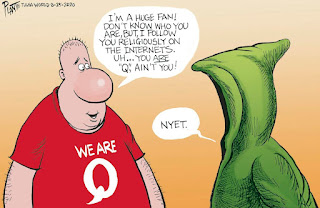Michael - Thursday
QAnon started with the posts of a mysterious person who signed himself simply Q. He claimed to be a high level US government official with “Q-level security clearance” and access to top level secret information about the enemies of the Trump administration. He first post on an anonymous website in October 2017 began, “Open your eyes. Many in our govt worship Satan.”
The resulting movement became known as QAnon after the anonymous Q.
Everything goes back to the “inside information” revealed in the “drops” (posts) of the anonymous Q. Some contained claims which were proved false—Hilary Clinton would be arrested on such and such a date, Mark Zuckerberg would flee the US, etc. These were subsequently referred to as “necessary disinformation” if they were referred to at all. There were clues and coded messages. Researchers have suggested that this was deliberately to encourage people to engage and post their own thoughts and deductions—a new technique to spread a conspiracy theories.
 |
| Ron Watkins Coming to a Congress near you... |
Paul Furber was an active supporter and disseminator of Q’s
ideas from quite early in the piece. It all made sense to him. He still
believed in Pizzagate. Why wasn’t that just the tip of an awful iceberg of evil
and corruption? The evidence pointing to Furber is that his own posts and those
of his supposed inspiration Q are stylistically and structurally the same. It’s
the sort of computer analysis that allows one to check if, for example, a
newly-discovered play was actually written by Shakespeare, whether Marlowe
was actually Shakespeare, and so on. (That’s another whole story that we won’t
go into now.) In a nutshell, you can tell with a certain probability if someone wrote something by looking at a lot of
other things they wrote. Two groups of
researchers modified their codes to apply them to social media
posts and started trying to match Q's posts with those of his followers. Furber fits the bill with a high nineties per cent probability for both systems. Watkins much
less so initially, but in mid-2018 it suddenly turns on its head to Watkins with high
probability and Furber much less so.
 |
| Paul Furber Get your software and conspiracy theories here |
Furber denies being Q. Of course he would, wouldn’t he? He agrees that his style is similar but claims that's because of the huge impact Q’s thinking has had on him. Linguistic experts dismiss that as “unlikely”. And there is some circumstantial evidence. Furber blames Watkins for “hijacking” Q’s work in 2018, leading Q to eventually withdraw from sharing his information. (Q's last post was in 2020.) Furber is nostalgic, writing that “Like a child being taken around his father’s workshop for the first time,we were being given a behind-the-scenes look into the ugly and corrupt world of geopolitics.” Nicely put, even if that behind-the-scenes look was all inside his own head.
Are these revelations about the identity of Q likely to
change people’s beliefs in the QAnon conspiracy theories? What do you think?

















P. T. Barnum had it right long ago...
ReplyDeleteI think my head hurts after reading that. We have the 'Freedom Alliance' who think it's all about Bill Gates and his nanobots.
ReplyDeleteI have my own theory about Shakespeare. I think his wife wrote everything he had published!!
I think I mentioned before that a friend who formerly held a high position in a major US state's mental health system once told me that in his experience 20% of the people walking the streets should be institutionalized, an additional 20% are in need of heavy medication, and of the remaining 60%, half will likely not agree with whatever you have to say.
ReplyDeleteWelcome to our world.